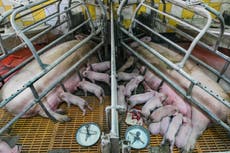Halt the climate and nature-loss crises to prevent more pandemics, scientists tell world leaders
Experts call for less consumption of wildlife, palm oil and exotic wood and for potential taxes on meat
The world must tackle the biodiversity and climate crises to stand a chance of preventing future pandemics, the world's leading experts on nature are warning.
That includes setting up an international body of leaders to minimise risks, the scientists say.
Where there is a clear link to high pandemic risk, taxes on meat consumption and production should be considered, and incentives should be provided to switch away from high-risk industries such as fur farming, they suggest.
The Intergovernmental Science-Policy Platform on Biodiversity and Ecosystem Services (IPBES), which last year issued a landmark report warning against the ecological emergency, also says the cost of doing nothing is much higher than that of action.
Policies it suggests include:
- the launch of a high-level intergovernmental council on pandemic prevention
- companies that fund widespread change of land use should be given incentives to stop
- funding the conservation of critical areas for biodiversity
- the design of a green economic recovery that offers “an insurance against future outbreaks”
- providing incentives for alternatives to “high-pandemic-risk consumption patterns”, such as the use of fur from farmed wildlife
- increasing sustainability in agriculture
- promoting a transition to healthier and more sustainable and diverse diets, “including responsible meat consumption”
- and promoting sustainable mechanisms to achieve greater food security and reduce consumption of wildlife
New disease outbreaks are happening more frequently now than at any other time in history, and the scientists warn that unless there is a massive shift in human activity, the world will face future more damaging outbreaks.
And they call for world leaders to enable “transformative change to reduce the types of consumption, globalised agricultural expansion and trade that have led to pandemics”.
The report identifies palm oil, exotic wood, products requiring mine extraction, transport infrastructures, meat and other products of globalised livestock production as those needing change.
And blaming wildlife for their emergence is wrong because it is caused by human activities, the paper explains.
“The underlying causes of pandemics are the same global environmental changes that drive biodiversity loss and climate change. These include land-use change, agricultural expansion and intensification, and wildlife trade and consumption.
“These drivers of change bring wildlife, livestock, and people into closer contact, allowing animal microbes to move into people and lead to infections, sometimes outbreaks, and more rarely into true pandemics that spread through road networks, urban centres and global travel and trade routes.
“The recent exponential rise in consumption and trade, driven by demand in developed countries and emerging economies, as well as by demographic pressure, has led to a series of emerging diseases that originate mainly in biodiverse developing countries, driven by global consumption patterns.”
It says pandemic risk could be “significantly lowered” by reducing unsustainable consumption of wildlife and wildlife-derived products and of commodities from emerging disease hot spots, as well as by reducing excessive consumption of meat from livestock production.
Climate change has also been blamed for disease emergence — such as tick-borne encephalitis in Scandinavia — and will probably cause substantial future pandemic risk, the experts warn.
Biodiversity loss arising from changes to landscapes can lead to increased disease risk when species that adapt well to human-dominated landscapes may harbour harmful pathogens.
While the scientists acknowledge that many of their solutions may seem “costly and difficult to execute” they say the costs are trivial compared with the trillions of dollars Covid-19 is costing, “let alone the rising tide of future diseases”.
Leaders from 190 countries had been scheduled to gather on Thursday in China for talks on a new biodiversity treaty to address the extinction crisis.
Marine ecologist Enric Sala said: "Everything we need to survive — the oxygen we breathe, the food we eat, the clean water we drink — is produced by the work of other species. But with the breakdown of nature, we face a mass extinction of these species.
“The most expensive thing we can do is return to business as usual.”
Mark Wright, director of science at WWF, said: “This report confirms the findings of WWF’s Living Planet Report that with nature in freefall, we need transformative action to protect our environment, to help prevent future pandemics and safeguard our economy. It estimates the cost of responding to pandemics to be 100 times more than the cost of preventing them and this must serve as a wake-up call for our world.”
Interested in learning more about the Climate Crisis? Follow Independent Climate on Instagram.
Join our commenting forum
Join thought-provoking conversations, follow other Independent readers and see their replies
Comments





Bookmark popover
Removed from bookmarks